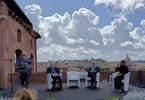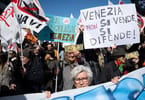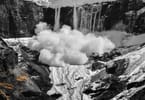MARIB, Yemen — In Yemen’s region of Marib, capital of the mythical kingdom of the Queen of Sheba, the followers of Al-Qaeda might well outnumber tourists these days.
The road linking the capital Sanaa with Marib 170-kilometres (around 105 miles) to the east is dotted with 17 army and police checkpoints, reflecting the dire state of security in the impoverished Arabian peninsula country.
The threat of attacks by a rejuvenated local Al-Qaeda franchise and the risk of kidnappings by local tribesmen trying to extract concessions from the government, have forced Westerners wanting to travel outside Sanaa to obtain permits — and a security forces escort.
Concerns have increased in the capital as well, after the US embassy was targeted last September by a double car bomb attack claimed by Al-Qaeda that killed 19 people, including seven attackers.
Some Western embassies are now concealed behind five-metre-high (16-foot) blast walls, and some diplomats have said they believe there is an influx of “terrorists” in Yemen.
In January the local Al-Qaeda branch announced in a video message posted on the Internet the merging of the Saudi and Yemeni branches into “Al-Qaeda in the Arabian Peninsula,” led by Yemeni Nasser al-Wahaishi.
Experts say the fact that Saudi militants have pledged allegiance to the Yemeni branch confirms that the Saudi section has been practically wiped out.
Some Yemen-based Western companies and institutions have moved staff and their families out of the country after a string of attacks claimed by the local Al-Qaeda branch.
In January 2008 two Belgian tourists were shot dead along with their local guide and driver in eastern Yemen. Two months later, the US embassy was the target of mortar fire which missed and hit a school, killing two people.
In April 2008 a complex of villas inhabited by US oil experts in Sanaa was hit by rockets, and the same month the Italian embassy also came under attack. It later relocated to a less exposed location.
Also last April the French oil group Total, involved in oil and liquefied gas projects in Yemen, decided to repatriate the families of its employees.
And in July Paris announced the closure of the French school in Sanaa and told the families of French government employees to leave as a precaution.
“It was an accumulation of things,” said Joel Fort, General Manager of Yemen LNG, in which Total is the lead shareholder.
Experts believe Al-Qaeda has found a second life in Yemen — ancestral home of the group’s founder Osama bin Laden — after seemingly being eliminated in neighbouring Saudi Arabia.
“Every indication points in that direction,” according to one Sanaa-based diplomat who, like others interviewed by AFP, asked not to be identified.
Another diplomat said: “It is almost certain that there is an influx of terrorists in Yemen. The terrorists driven out of Afghanistan or elsewhere tend to take refuge here and find, if not a sanctuary, at least a place to hide.”
Yemen is an ideal hiding ground for terrorists, courtesy of rugged mountainous terrain which covers large swathes of the country and the government’s quasi inability to control the vast tribal areas in the east.
The authorities acknowledge that Al-Qaeda militants could be hiding in provinces east of Sanaa, such as Al-Jawf, Marib, Shabwa, Ataq or Hadramawt.
In February President Ali Abdullah Saleh visited Marib to urge the tribes not to support Al-Qaeda, in a trip highlighting the government’s concerns.
However some Westerners believe the situation has stabilised since last September’s attack on the US embassy.
“Over the past months, the situation has been, maybe not excellent, but has stabilised,” said Yemen LNG official Fort.
A Sanaa-based diplomat agreed.
“Some are listing Kabul, Baghdad and Sanaa in the same category. But we are not there yet. You have to have a reasonable approach,” he said.
Few tourists visit Yemen, probably more discouraged by the abductions of Westerners by powerful tribes who then use them as bargaining chips with the authorities rather than by the threat of “terror” attacks.
Those kidnapped are generally freed unharmed.
Italian tourist Pio Fausto Tomada, 60, is among the few to visit Yemen.
“I’m definitely not scared,” he said with a smile, as he waited on the steps of a Sanaa hotel to join a group of aged Italian tourists on an excursion under heavy protection.
In Marib tourists are rare since a car bomb attack in July 2007 killed eight Spanish holidaymakers and two Yemeni drivers.
The attack took place at the entrance to Mahram Bilqis, an ancient oval-shaped temple which legend says belonged to the Biblical Queen of Sheba.
Ali Ahmad Musallah, a guard at the site for the past 12 years who earns a meagre 20,000 Yemeni Riyals (100 dollars) per month, well remembers the 2007 attack in which he said one of his children was hurt.
“Before the attack, this was the most frequented tourist site in Marib” with 40-60 visitors each day, he told AFP, clutching an antiquated rifle.
Hotel infrastructure is almost non-existent outside the big cities, ruling out mass tourism in Yemen, despite its incredible archaeological riches.
ŠTA UZIMATI IZ OVOG ČLANKA:
- In January the local Al-Qaeda branch announced in a video message posted on the Internet the merging of the Saudi and Yemeni branches into “Al-Qaeda in the Arabian Peninsula,”.
- And in July Paris announced the closure of the French school in Sanaa and told the families of French government employees to leave as a precaution.
- He said with a smile, as he waited on the steps of a Sanaa hotel to join a group of aged Italian….






















